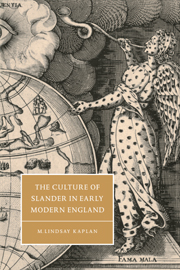Book contents
- Frontmatter
- Contents
- Acknowledgments
- Introduction: censorship versus slander
- 1 The paradox of slander
- 2 Allegories of defamation in The Faerie Queene Books iv–vi
- 3 Satire and the arraignment of the Poetaster
- 4 Slander for slander in Measure for Measure
- Conclusion
- Notes
- Works cited
- Index
- Cambridge Studies in Renaissance Literature and Culture
Introduction: censorship versus slander
Published online by Cambridge University Press: 03 December 2009
- Frontmatter
- Contents
- Acknowledgments
- Introduction: censorship versus slander
- 1 The paradox of slander
- 2 Allegories of defamation in The Faerie Queene Books iv–vi
- 3 Satire and the arraignment of the Poetaster
- 4 Slander for slander in Measure for Measure
- Conclusion
- Notes
- Works cited
- Index
- Cambridge Studies in Renaissance Literature and Culture
Summary
This book advances the argument that slander provides a model crucial for the analysis of power relations between poets and state in early modern England, and by extension that the concept of censorship, currently employed by critics of early modern English literature to discuss these relations, serves rather to limit and distort our understanding. In recent years, critical interest in power in the early modern period has taken up the question of the nature and extent of control the state was able to exercise over literary expression, as well as explored the capacity for resistance or challenge that literature could pose to political authority. These discussions have for the most part assumed or explicitly articulated a paradigm of censorship as the appropriate context for analyzing power relations between the poet and the state. However, the use of censorship, particularly of the drama, as an analytic focus poses a few problems. The term is often employed anachronistically in presupposing a hierarchical exercise of power only possible for a centralized state bureaucracy and thus inapplicable to early modern England. Typically, the narrow focus on regulatory mechanisms and topical content employed by scholars of censorship prevents our understanding how the control of literary production was shaped by, and shaped, larger socio-political concern in the period over the control of language in general. While discussions of censorship in the past decade made some valuable contributions to our understanding of early modern English texts, they virtually ignored the significance of defamation, a critical concern that fueled official attempts in England to control a whole range of discourses from the Reformation forward.
- Type
- Chapter
- Information
- The Culture of Slander in Early Modern England , pp. 1 - 11Publisher: Cambridge University PressPrint publication year: 1997

